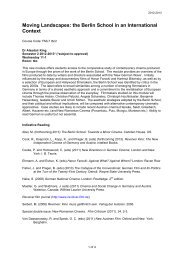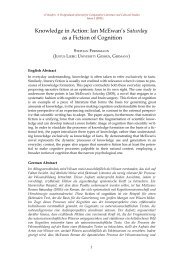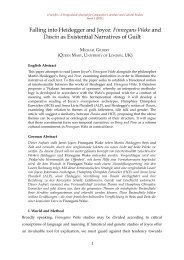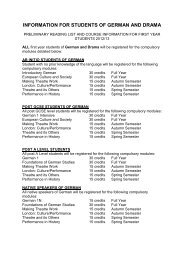Student Handbook - The School of Language, Linguistics and Film
Student Handbook - The School of Language, Linguistics and Film
Student Handbook - The School of Language, Linguistics and Film
You also want an ePaper? Increase the reach of your titles
YUMPU automatically turns print PDFs into web optimized ePapers that Google loves.
e-sit it at the next available opportunity but still fail to pass it, you will have one more<br />
attempt to re-sit the module at the next available opportunity should you wish to do so.<br />
<strong>Student</strong>s who commenced their programme <strong>of</strong> study in 2011 or later - You have two<br />
attempts to pass a module – one original attempt (where you study for the module for the<br />
first time) <strong>and</strong> one re-sit attempt which must be taken at the next available opportunity.<br />
If you have exhausted all your permitted attempts to pass a module but still have failed to<br />
pass it, the mark that will remain on your transcript <strong>and</strong> that will be used in your degree<br />
classification calculation is the highest mark you have achieved for the module, not the most<br />
recent.<br />
First sitting modules<br />
<strong>Student</strong>s who have not attended an examination or who have not submitted coursework <strong>and</strong><br />
have submitted an application for extenuating circumstances which has been accepted by<br />
the Examination Board (see § 4.2 EXTENUATING CIRCUMSTANCES) may be <strong>of</strong>fered a<br />
first sit in that module at the discretion <strong>of</strong> the Examination Board. <strong>The</strong> timing <strong>of</strong> the first sit<br />
will depend on your individual circumstances:<br />
If you have met the progression requirements for your degree programme, the first sit will<br />
take place in the following academic year. If the missing item <strong>of</strong> assessment is an<br />
examination you will sit in the following May alongside your other examinations. If the<br />
missing item <strong>of</strong> assessment is coursework you will be set a deadline for submission in the<br />
following academic year. You will not attend classes in the module which you are first sitting.<br />
If you need to pass the first sit to meet the progression requirements for your degree<br />
programme, the first sit will take place during the summer vacation <strong>of</strong> the same academic<br />
year. If you pass the first sits <strong>and</strong> meet the requirements for progression you will be able to<br />
progress into the next year <strong>of</strong> your degree programme in September.<br />
Please note that the decision regarding the timing <strong>of</strong> first sits is made by the Examination<br />
Board not by the student. Under the College’s Academic Regulations final year students are<br />
not permitted to take late summer first sits <strong>and</strong> therefore must wait until the following<br />
academic year.<br />
First sit modules are not pegged at 40E <strong>and</strong> the full range <strong>of</strong> marks will be available.<br />
Retaking an academic year (First Take)<br />
<strong>Student</strong>s can only be permitted to re-take an academic year in very exceptional<br />
circumstances. This is known as a “first take”. You must have applied for your extenuating<br />
circumstances to be taken into account before the Examination Board meets (see § 4.2<br />
EXTENUATING CIRCUMSTANCES). If the first take is authorised, you will attend all<br />
classes <strong>and</strong> submit the entire assessment for your modules again. You must take the same<br />
modules in your first take year that you were registered for on the original attempt (unless<br />
the <strong>School</strong> is not <strong>of</strong>fering that module again). Results for first-taken modules are not pegged<br />
at 40E <strong>and</strong> the full range <strong>of</strong> marks will be available.<br />
Marking <strong>and</strong> examining<br />
Marking <strong>and</strong> examining <strong>of</strong> work which counts towards classification (assessed coursework<br />
or written examination) is done by teachers who have had to be formally approved as<br />
Examiners. <strong>The</strong>re are three stages in marking to ensure that a fair mark is arrived at: the<br />
work is marked by two teachers <strong>and</strong> if, after serious discussion, there remains any<br />
uncertainty about the appropriate mark, it is sent to an External Examiner, who has a right to<br />
see all the students’ work for that module, who thus has an overview <strong>and</strong> whose final<br />
45







